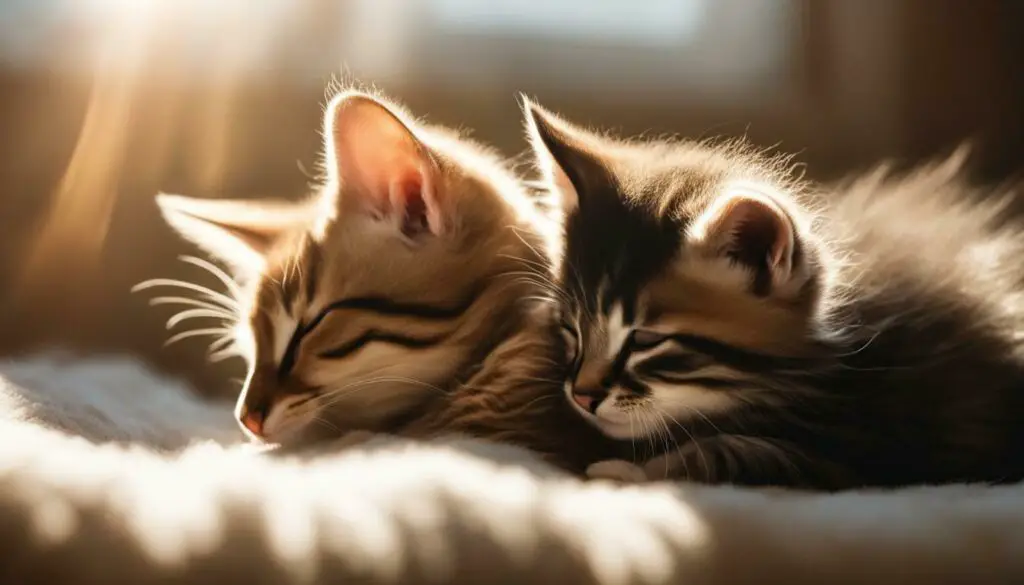As a pet expert, I often get asked, “How long do kittens stay with their mom?” In this guide, I’ll take you through the various stages of kitten development and explore the crucial socialization period they spend with their mother.
During the early stages of a kitten’s life, staying with their mother is essential for their overall development. Kittens should ideally stay with their mother until they are at least 8 weeks old, with 10 weeks being even better. By this age, they will have gone through important milestones in their development.
Key Takeaways:
- The ideal age for kittens to stay with their mother is at least 8 weeks, but 10 weeks is even better.
- Staying with their mother allows kittens to be properly weaned, and their eyesight and hearing to fully develop.
- Kittens learn vital social and behavioral skills from their mother and littermates during the socialization period.
- Separating kittens from their mother too soon can cause developmental issues and behavioral problems.
- If kittens are orphaned or separated early, extra care and attention are needed to ensure their well-being and development.
The Nursing Period: Building Strength and Immunity
During the nursing period, which usually lasts around 4 to 5 weeks, kittens rely on their mother’s milk for nourishment and critical antibodies that help boost their immune systems. This early stage of development is crucial for their growth and overall health. As a caretaker, it is essential to provide proper care and support during this time to ensure the best possible start for the kittens.
One of the key aspects of caring for nursing kittens is to ensure that the mother cat is receiving a balanced diet with a high-quality cat food formula. This will provide her with the necessary nutrients to produce nutritious milk for her offspring. Additionally, it is important to create a quiet and comfortable space for the mother cat and her kittens, as a calm environment promotes bonding and reduces stress.
While the mother cat will typically handle most of the nursing responsibilities, it is still crucial to monitor the kittens’ progress closely. Regular weigh-ins can help track their growth and ensure that they are gaining weight appropriately. If there are any concerns or if a kitten appears to be struggling, it is advisable to consult a veterinarian for guidance and support.
Overall, the nursing period is a vital time for kittens to build strength and develop their immune systems. By providing the necessary care, nutrition, and a nurturing environment, you can help ensure that the kittens have the best start in life and set them on a path to grow into healthy, happy adult cats.
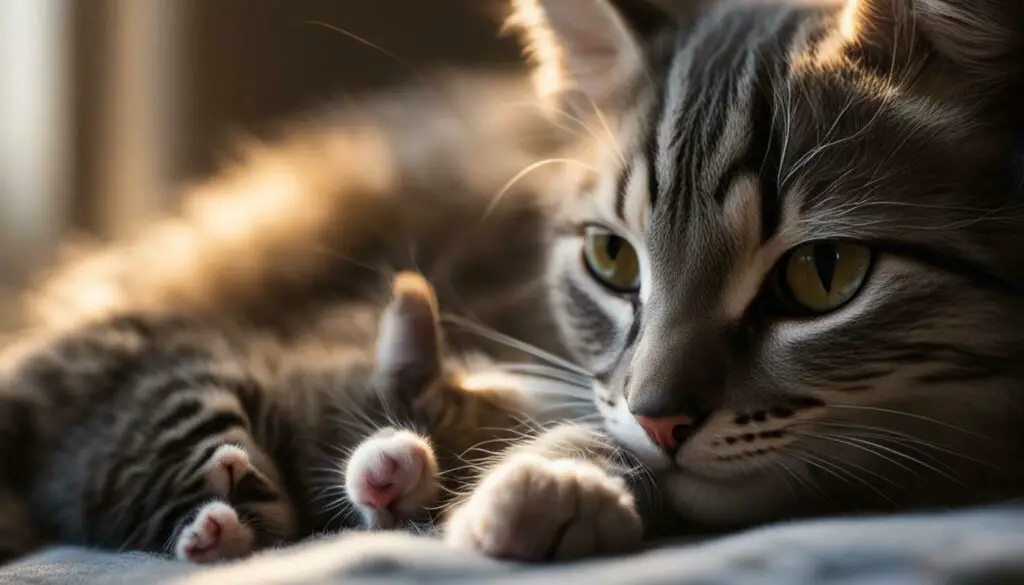
Eyesight and Hearing Development: Opening Up to the World
Around 2 to 3 weeks old, kittens begin to open their eyes, and their hearing becomes more acute, allowing them to start exploring the world around them. It is an exciting time as their senses develop, and they become more aware of their surroundings. This stage is crucial for their overall development and lays the foundation for their future interactions and learning experiences.
As their eyesight improves, kittens start to perceive shapes and movement, helping them navigate their environment more effectively. They may initially have blurry vision, but it sharpens over time, enabling them to focus on objects and people. Their curiosity grows, and they become eager to explore their surroundings, as their visual perception allows them to assess distances, heights, and depths with greater accuracy.
Furthermore, their hearing evolves, allowing them to distinguish various sounds and vocalizations. They become more responsive to human voices, recognizing familiar tones and inflections. This is the opportune time to introduce gentle, soothing sounds and positive human interactions, helping to build trust and bond with the kittens. Building a strong foundation of trust and positive socialization during this period contributes significantly to their emotional well-being and future interactions with humans and other animals.
Visual and Auditory Stimulation: Encouraging Healthy Development
To support the kittens’ visual and auditory development, it is essential to create a stimulating environment that provides them with a variety of sights and sounds. Providing safe toys with different textures, colors, and shapes can encourage their visual exploration and help develop their hand-eye coordination. Gentle background sounds like soft music or nature sounds can help acclimate them to different noises and promote a sense of security.
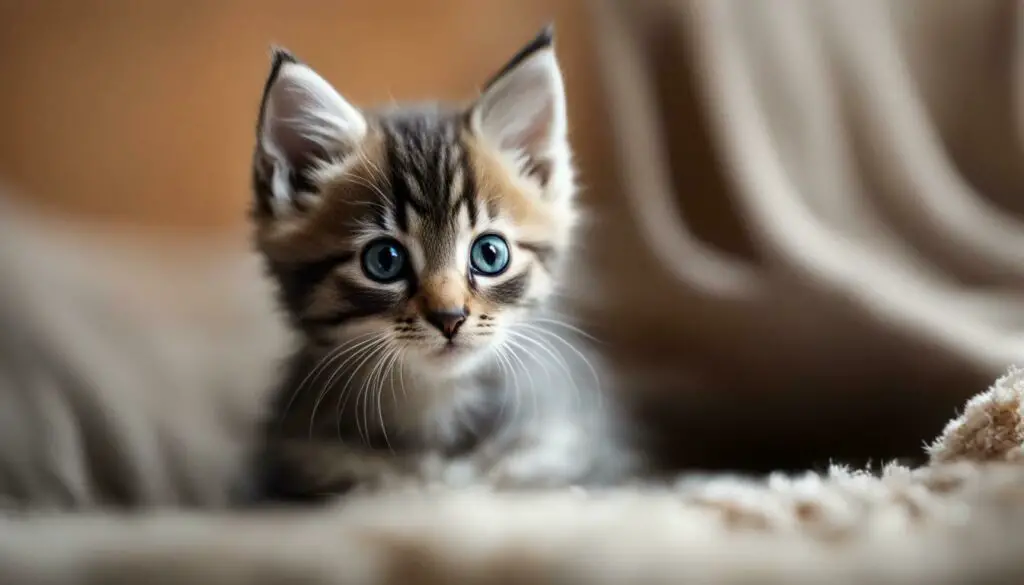
Table: Developmental Milestones for Eyesight and Hearing
| Age | Eyesight Development | Hearing Development |
|---|---|---|
| 2-3 weeks | Begin to open eyes; blurry vision | Hearing becomes more acute |
| 4-6 weeks | Sharpens vision; perceive shapes and movement | Recognize familiar voices; respond to sounds |
| 6-8 weeks | Clear, focused vision; assess depth and distance | React to various sounds; learn vocalizations |
Conclusion
Eyesight and hearing development are vital stages in a kitten’s journey of exploration and self-discovery. As their senses grow stronger, they become more receptive to the world around them and the interactions they have with their environment, humans, and other animals. By providing a nurturing and stimulating environment during this developmental period, we can help them build a solid foundation for their future social, emotional, and cognitive well-being.
Socialization and Behavioral Learning: Lessons from Mom and Siblings
Kittens learn important social cues and behavior through playful interactions with their mother and littermates during the socialization period, which typically occurs between 3 to 7 weeks old. This period is crucial for their development and plays a significant role in shaping their future interactions and overall temperament.
During this time, kittens engage in various playful activities with their mother and siblings, such as chasing, wrestling, and grooming. These interactions teach them important social skills, such as appropriate play behavior, communication cues, and bite inhibition. Kittens also learn how to read and respond to body language, helping them navigate social situations with other cats and humans in the future.
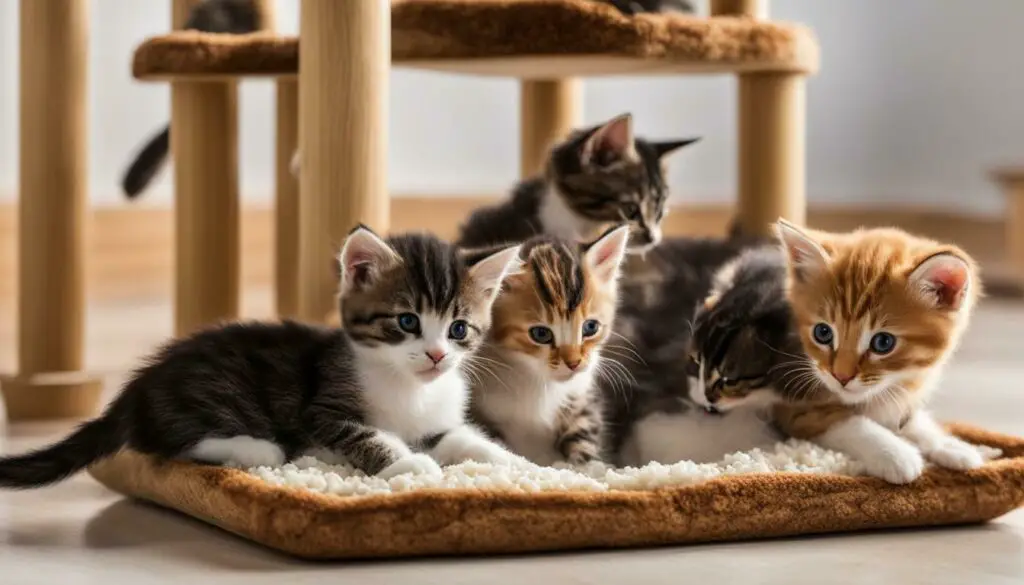
Providing an enriching environment during the socialization period is essential for a kitten’s well-being. Exposing them to different sights, sounds, and experiences can help prepare them for a variety of situations they may encounter later in life. It is also important to allow kittens to interact with humans, helping them develop trust, familiarity, and positive associations with people.
Weaning: Transitioning to Solid Foods
Around 4 to 5 weeks old, kittens start to show interest in solid foods, signaling the beginning of the weaning process. At this stage, it is important to introduce them to a variety of kitten-friendly foods to ensure they receive the necessary nutrients for their growth and development.
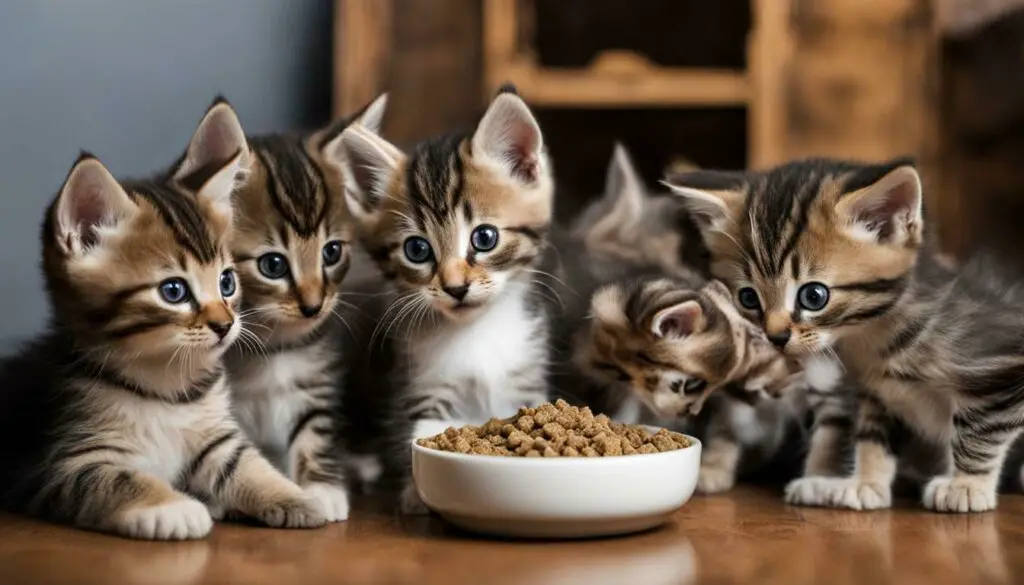
When introducing solid foods, it’s best to start with a soft and easily digestible option, such as wet kitten food mixed with a small amount of warm water. Gradually decrease the amount of water until they are eating the wet food on its own. You can also offer small amounts of dry kitten food, ensuring it is specifically formulated for kittens to meet their unique nutritional needs.
| Kitten Care Tips for Weaning: | |
|---|---|
| 1. | Monitor their progress: Observe how your kittens are adjusting to the solid food and ensure they are eating and drinking enough. |
| 2. | Provide a clean and shallow dish: Use a dish that is easy for them to access and clean regularly to maintain hygiene. |
| 3. | Introduce new foods gradually: Slowly introduce new flavors and textures to their diet to expand their palate. |
| 4. | Offer fresh water: Alongside solid food, provide fresh water to keep your kittens hydrated. |
During the weaning process, patience is key. Some kittens may take longer to adjust to solid foods than others. If you have any concerns about their progress or if they seem to be struggling with the transition, consult your veterinarian for guidance and support.
The Ideal Time to Separate Kittens from Mom
While kittens should ideally stay with their mother until they are at least 8 weeks old, it is even better for their development to remain with her until they are 10 weeks old. During this time, kittens learn essential skills from their mother, such as proper grooming, using the litter box, and social interaction with other cats. This period of bonding and learning is crucial for their overall well-being.
Separating kittens from their mother too early, before they have had a chance to fully develop, can have negative consequences. Kittens that are separated too soon may experience stunted growth, increased susceptibility to illness, and behavioral problems. It is important to give kittens enough time with their mother to ensure they receive the proper care, nutrition, and socialization they need.
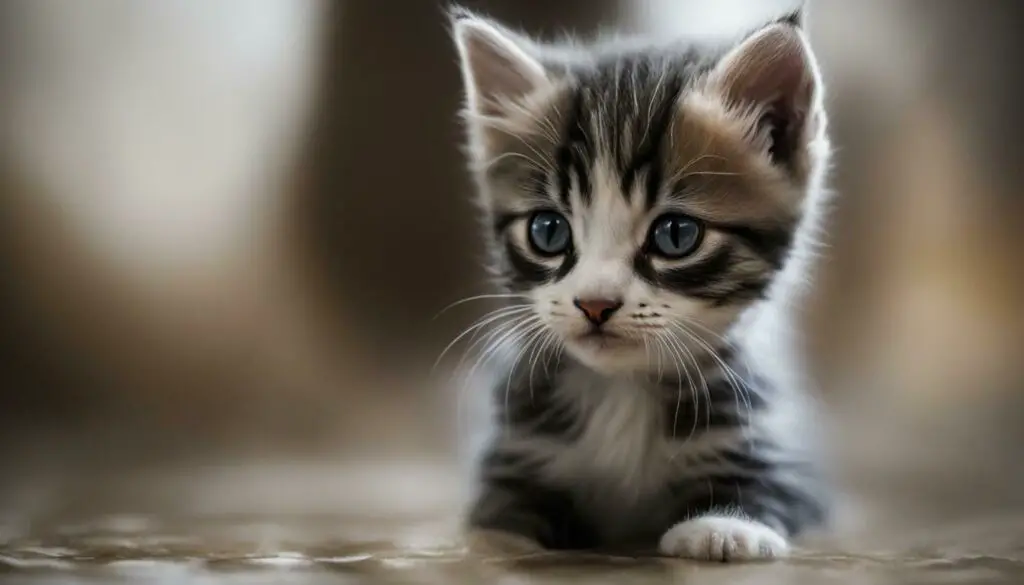
When the time comes to separate kittens from their mother, it should be done gradually. Sudden separation can cause anxiety and stress for both the mother and the kittens. Slowly introducing independence by providing a safe and comfortable space for the kittens, along with plenty of stimulation and interaction, can help ease the transition.
Remember, every kitten is unique, and their readiness for separation may vary. Observing their behavior and consulting with a veterinarian can help determine the ideal time to separate kittens from their mother while considering their individual needs and development.
Table: Benefits of Allowing Kittens to Stay with Their Mother
| Benefits | Description |
|---|---|
| Proper growth and development | Being with their mother helps kittens receive the necessary nutrients and care for healthy growth and development. |
| Strong immune system | During the nursing period, kittens receive essential antibodies from their mother’s milk, bolstering their immune system. |
| Socialization skills | Interacting with their mother and littermates helps kittens learn vital social and behavioral skills. |
| Reduced separation anxiety | Staying with their mother for an adequate period can minimize separation anxiety when they are eventually separated. |
Adopting Orphaned or Early-Separated Kittens
Adopting an orphaned or early-separated kitten requires special attention and care to ensure their well-being and proper development. These kittens have been deprived of their mother’s nurturing presence and the valuable lessons they would have learned from their littermates. As a responsible adopter, it is crucial to provide the love, care, and socialization that these kittens need to thrive.
First and foremost, it is essential to address their nutritional needs. Bottle-feeding with a formula specifically designed for kittens is necessary to ensure they receive proper nourishment. It’s crucial to follow a feeding schedule and monitor their weight gain to track their growth and development.
Socialization is another vital aspect to consider when adopting orphaned or early-separated kittens. These kittens may have missed out on important lessons in communication and behavior that they would have learned from their mother and littermates. Therefore, introducing them to other kittens, under controlled and supervised conditions, can help them develop these essential skills and build healthy social bonds.
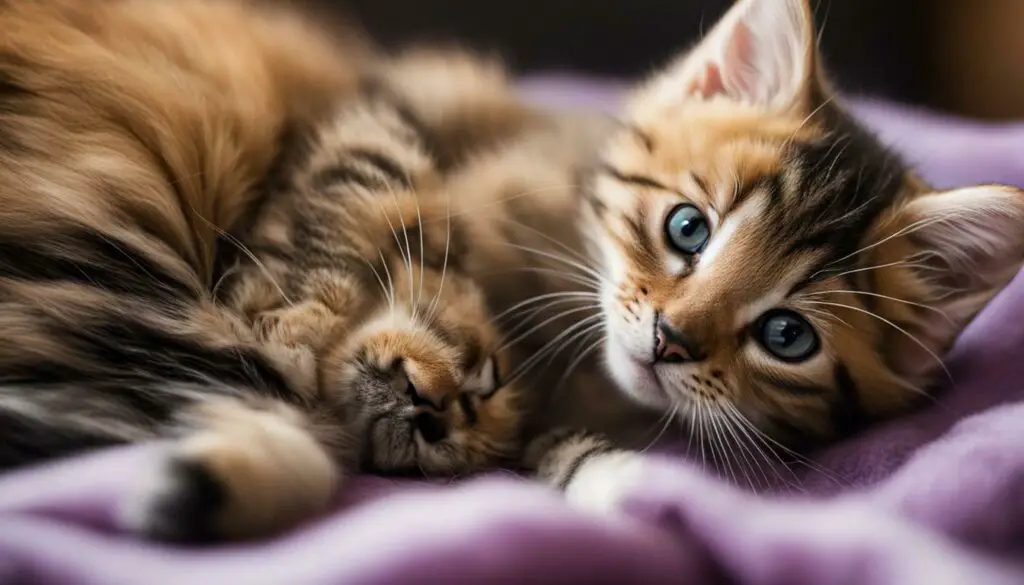
Lastly, it’s important to be aware of potential separation anxiety that these kittens may experience. The loss of their mother and littermates can be emotionally challenging for them. Providing a nurturing environment with plenty of comfort, toys, and positive reinforcement can help alleviate their anxiety and promote a sense of security.
| Tips for Adopting Orphaned or Early-Separated Kittens |
|---|
| 1. Consult with a veterinarian experienced in kitten care for guidance and advice. |
| 2. Create a warm and safe space for the kitten, including a cozy bed, litter box, and stimulating toys. |
| 3. Gradually introduce the kitten to new experiences, people, and other pets to encourage their social development. |
| 4. Provide regular veterinary check-ups to monitor their health and ensure they receive necessary vaccinations. |
| 5. Seek support from reputable animal welfare organizations or online communities for additional advice and resources. |
By understanding the unique needs of orphaned or early-separated kittens and providing them with the necessary care and attention, you can play a crucial role in helping them thrive and grow into happy, healthy cats.
Proper Care for Separated Kittens
When separated from their mother early, it is essential to provide separated kittens with proper care and nutrition to support their growth and overall well-being. These kittens require extra attention and specific measures to compensate for the loss of their mother’s care. Here are some important tips:
- Ensure proper nutrition: Separated kittens should be bottle-fed with a formula designed for kittens. Consult your veterinarian to choose the right formula and establish a feeding schedule based on their age and weight. It’s crucial to provide them with the necessary nutrients to support their growth and development.
- Monitor their health: Schedule regular veterinary check-ups to monitor the health of separated kittens. They may be more susceptible to certain illnesses and require additional vaccinations. Regular check-ups will help identify any potential health issues early and ensure they receive appropriate care.
- Create a nurturing environment: Provide a warm and safe environment for separated kittens. Use a snug and comfortable bed, and consider using a heating pad or a warm water bottle wrapped in a towel to mimic the warmth of their mother. Be cautious with the temperature and ensure they have room to move away if they feel too warm.
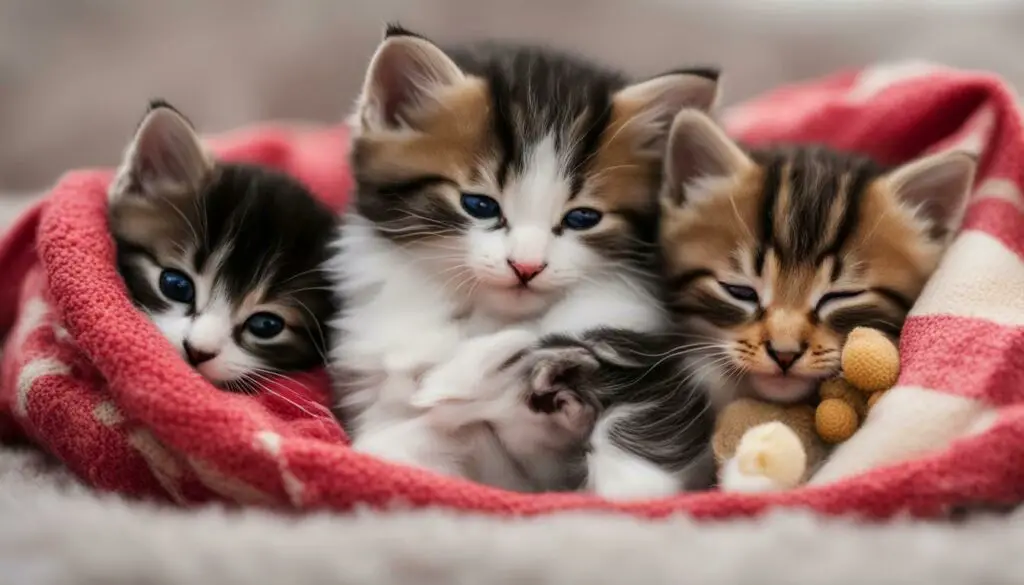
Remember, the bond between a mother cat and her kittens is crucial for their overall well-being and development. While separations may occur for various reasons, it’s important to provide separated kittens with the best possible care to ensure they grow into healthy and happy cats.
Proper Nutrition: The Key to Healthy Growth
Proper nutrition plays a vital role in the growth and development of separated kittens. Choosing the right formula and establishing a feeding schedule based on their age and weight are critical factors. Consult your veterinarian for guidance on how much and how often to feed your kitten.
| Age | Amount of Formula | Feeding Frequency |
|---|---|---|
| Newborn to 1 week | 5-7ml per feeding | Every 2-3 hours (including during the night) |
| 2-4 weeks | 10-15ml per feeding | Every 3-4 hours (gradually reducing nighttime feedings) |
| 4-6 weeks | 15-20ml per feeding | Every 4-6 hours (nighttime feedings can be discontinued) |
It’s important to monitor your kitten’s weight and adjust the feeding amounts accordingly. As they grow, you can introduce them to solid foods gradually, starting with specially formulated kitten food softened with warm water. Provide fresh water in a shallow dish from around 4 weeks old.
Bottle-Feeding: Meeting Nutritional Needs
For kittens separated from their mother before they are fully weaned, bottle-feeding with a specially formulated kitten formula is crucial to ensure they receive the necessary nutrients for their growth and development. Kittens rely on their mother’s milk for essential vitamins, minerals, and antibodies that boost their immune system. When this natural source of nutrition is not available, it is important to provide a suitable alternative.
Choosing the right formula: Look for a commercial kitten formula that is specifically designed to meet their nutritional needs. These formulas are available in most pet stores and veterinary clinics. Avoid using cow’s milk or other human milk substitutes, as they can cause digestive upset in kittens. Consult your veterinarian for guidance on selecting the most appropriate formula for your kitten.
| Feeding Tips: |
|---|
| Use a small, sterilized bottle with a nipple designed for kittens. Make sure the nipple has a small hole to allow for easy feeding. |
| Warm the formula to about 100°F (37°C) before each feeding. Test the temperature on your wrist to ensure it is not too hot. |
| Feed your kitten in a comfortable and quiet area, holding them in an upright position. Allow them to suckle at their own pace. |
| Feed your kitten according to their age and weight. Newborn kittens typically require feeding every 2-4 hours. As they grow, the frequency can be gradually reduced. |
| Observe your kitten’s behavior during feedings. They should be alert, active, and gaining weight steadily. Consult your veterinarian if you notice any unusual changes or concerns. |
Remember, proper nutrition is essential for a healthy start in life. Consult your veterinarian for personalized advice and guidance on bottle-feeding techniques and feeding schedules tailored to your kitten’s individual needs.
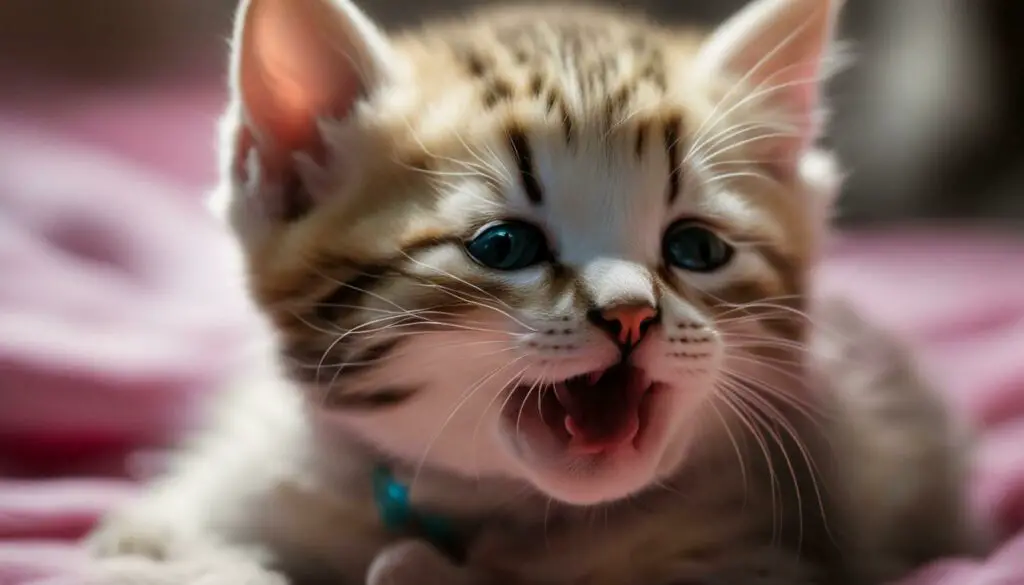
Quote:
“Bottle-feeding provides essential nutrition for kittens separated from their mother early. Choosing the right formula and following proper feeding techniques are key to their healthy growth and development.” – Dr. Angela Johnson, Veterinarian
Socializing Separated Kittens: Introducing Playmates
To prevent behavioral issues and promote healthy social development, it is important to socialize separated kittens with other kittens of similar age. This allows them to learn valuable social skills and behaviors from their peers, which will benefit them throughout their lives.
When introducing new playmates to separated kittens, it is essential to do so gradually and in a controlled environment. Start by allowing them to interact through a physical barrier, such as a baby gate or wire mesh, to ensure their safety and allow for initial observations of their reactions and behaviors.
| Playdate Tips for Socializing Separated Kittens |
|---|
| 1. Introduce kittens of similar age and size to prevent hierarchy issues. |
| 2. Provide plenty of toys and play structures to encourage positive interactions. |
| 3. Supervise play sessions to ensure they remain gentle and non-aggressive. |
As the kittens become more comfortable with each other, gradually allow them to interact without any barriers. However, always supervise their play sessions to ensure they remain gentle and non-aggressive. If any signs of aggression or fear emerge, separate the kittens and try again at a later time.
Remember, the goal of introducing playmates to separated kittens is to provide them with opportunities to learn and practice appropriate social behaviors. By following these tips and providing a nurturing environment, you are helping them develop into well-adjusted and happy adult cats.
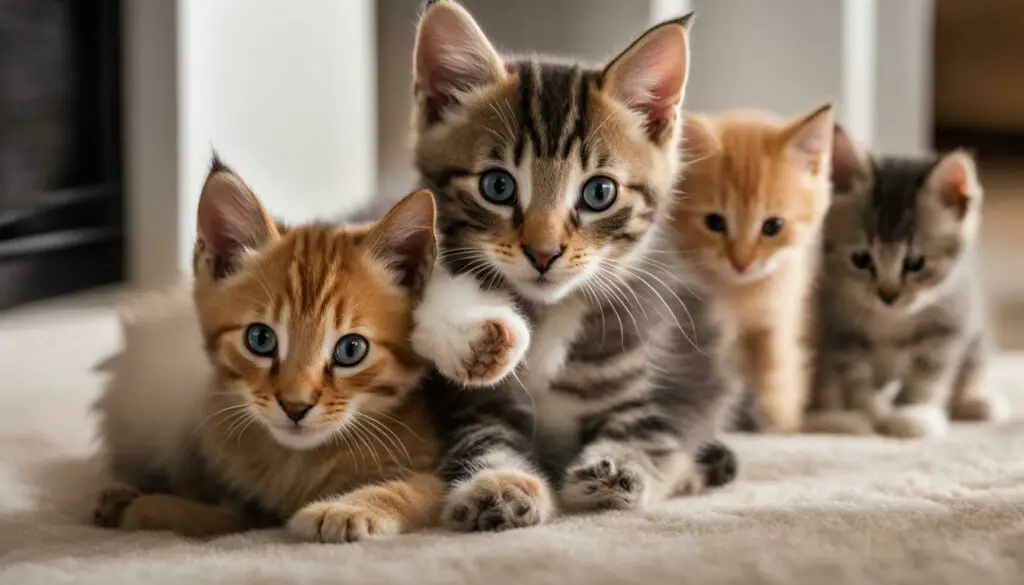
Separation Anxiety in Kittens: Addressing Emotional Needs
Kittens that have been separated from their mother early may experience separation anxiety, which can manifest in various ways, including excessive crying, clinginess, or destructive behavior. It is important to understand and address their emotional needs to help them feel secure and confident in their new environment.
To help alleviate separation anxiety, establish a routine that provides a sense of stability and predictability for your kitten. Set consistent feeding times and play sessions, and create a safe and comfortable space for them to retreat to when they need some alone time. This will help them develop a sense of security and trust in their new surroundings.
Introducing interactive toys and engaging in interactive play sessions can also help redirect your kitten’s attention away from their anxiety. Puzzle toys or treat-dispensing toys can provide mental stimulation and keep them occupied when you’re not able to be with them. Additionally, the use of pheromone sprays or diffusers, specifically designed for calming anxious cats, may also help create a soothing environment.
If your kitten’s separation anxiety persists or worsens, it is recommended to consult with a veterinarian or a professional animal behaviorist. They can provide further guidance and recommend additional strategies to address your kitten’s specific needs. Remember, patience, understanding, and a loving approach are key to helping your kitten overcome separation anxiety and thrive in their new home.
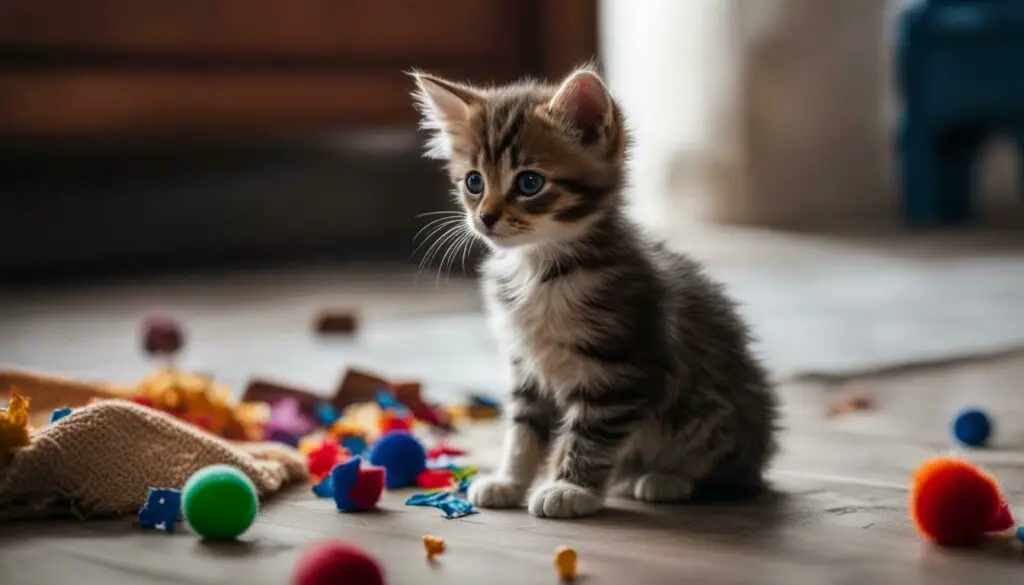
| Key Tips to Address Separation Anxiety: |
|---|
| Establish a routine: Set consistent feeding times, play sessions, and a safe space for your kitten. |
| Interactive toys: Provide mental stimulation and redirect their attention away from anxiety. |
| Calming environment: Consider using pheromone sprays or diffusers designed for anxious cats. |
| Consult a professional: If anxiety persists or worsens, seek guidance from a veterinarian or animal behaviorist. |
Conclusion
To ensure the healthy development of kittens, it is crucial to understand the various stages of their growth, the importance of mother-cat bonding, and to provide the necessary care and attention for those that have been separated from their mother early. Kittens should ideally stay with their mother until they are at least 8 weeks old, but 10 weeks is even better. By this age, they will have been weaned, their eyesight and hearing will have fully developed, and they will have learned important social and behavioral skills from their mother and littermates.
Separating kittens from their mother too soon can lead to developmental issues such as stunted growth, illness, and behavioral problems. However, if circumstances require early separation, it is essential to provide the proper care and nutrition for the kittens. Bottle-feeding with a formula designed for kittens can meet their nutritional needs, and socializing them with other kittens can help them develop proper social skills and behaviors.
For those who have adopted orphaned or early-separated kittens, extra attention and care are needed to ensure their well-being and development. These kittens may require bottle-feeding, specialized socialization, and addressing potential separation anxiety. It is important to seek guidance from veterinarians or reputable animal welfare organizations to ensure the best care for these kittens.
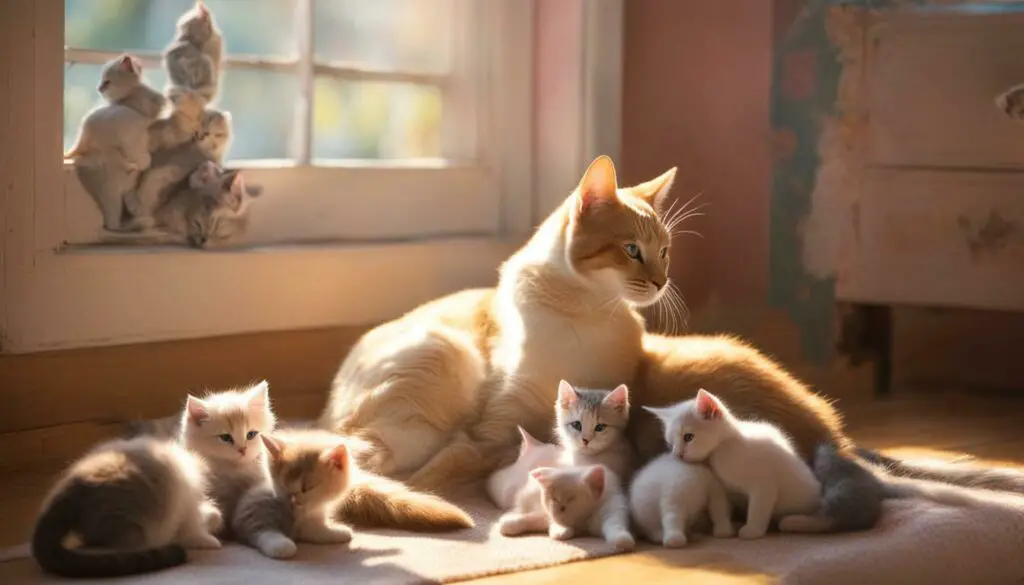
Additional Resources for Kitten Care
For further information and guidance on caring for kittens at different stages of their development, consider these additional resources:
- Recommended books on kitten care
- Websites dedicated to feline development and care
- Professional associations focused on cat welfare
By utilizing these resources and following the provided guidance, you can ensure that your kittens receive the best possible care and grow into happy and healthy adult cats.
Additional Resources for Kitten Care
If you’re looking for more in-depth information and resources on kitten care, here are some recommended books, websites, and professional associations that can provide further guidance:
- Kitten Care 101: A Comprehensive Guide by Sarah Johnson – This book covers all aspects of caring for a kitten, from nutrition and healthcare to socialization and training. It offers practical tips and advice for every stage of a kitten’s development.
- The Kitten Lady (website: thekittenlady.org) – This website, run by renowned kitten rescuer Hannah Shaw, is a valuable resource for kitten care. It provides educational articles, instructional videos, and a wealth of information on topics such as orphaned kittens, neonatal care, and fostering.
- The American Association of Feline Practitioners (website: catvets.com) – This professional association is dedicated to improving the health and welfare of cats. Their website offers a range of resources, including guidelines on kitten vaccination schedules, advice on behavior and enrichment, and information on finding a feline veterinarian in your area.
Remember, providing the best care for your kitten involves a combination of love, attention, and knowledge. By utilizing these resources, you can ensure that your furry friend receives the care they need to grow and thrive.
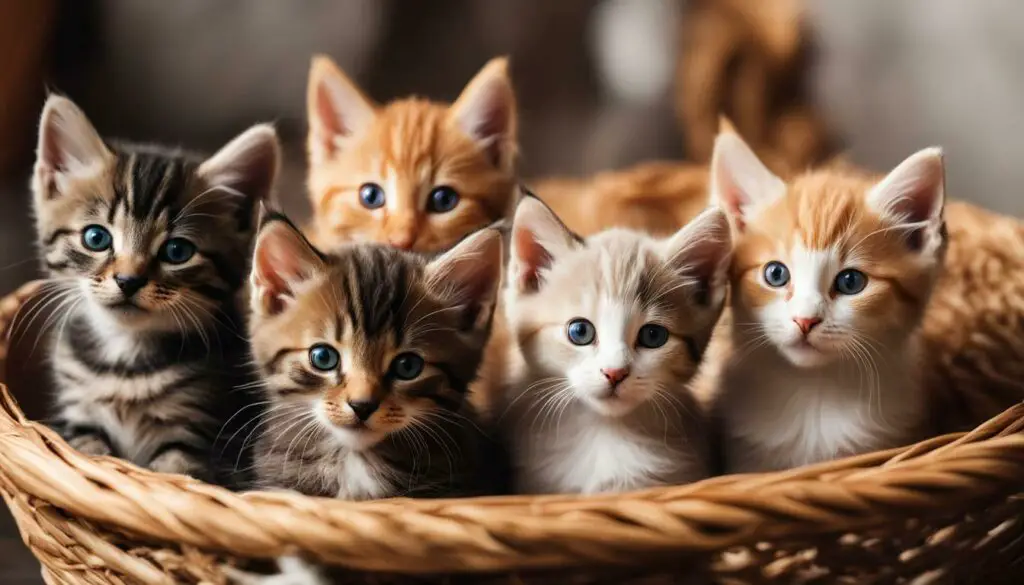
Whether you’re a first-time kitten owner or have years of experience, these resources are sure to enhance your understanding of kitten care. From books that delve into every aspect of kitten development to online platforms with practical advice and professional associations dedicated to feline health, there is a wealth of knowledge available to assist you in providing the best possible care for your furry friend.
Remember, caring for a young kitten is a rewarding but significant responsibility. By equipping yourself with the right information and resources, you can ensure that your kitten receives the love, care, and support they need to thrive into adulthood.
Further Assistance for Your Kitten’s Well-Being
If you have any specific concerns or questions about your kitten’s development or care, don’t hesitate to reach out to your local veterinarian or trusted animal welfare organizations for assistance and support. They have the knowledge and experience to provide you with valuable guidance tailored to your kitten’s unique needs.
When it comes to kitten care, it’s crucial to ensure they receive the proper nutrition, veterinary check-ups, and a nurturing environment to support their growth and development. Your local veterinarian can help you create a comprehensive care plan that includes a balanced diet, regular vaccinations, and preventative healthcare measures.
Trusted animal welfare organizations can also be an excellent resource for information and support. They often offer educational materials, workshops, and guidance on kitten care, including advice on socialization, behavioral training, and addressing separation anxiety.
Remember, taking care of a kitten requires patience, dedication, and a commitment to their well-being. Whether you have questions about their nutrition, behavior, or any other aspect of their care, don’t hesitate to seek professional guidance. Your local veterinarian and animal welfare organizations are there to provide you with the assistance and support you need to ensure your kitten’s health and happiness.
FAQ
How long should kittens stay with their mother?
Kittens should ideally stay with their mother until they are at least 8 weeks old, but 10 weeks is even better.
Why is it important for kittens to stay with their mother?
Staying with their mother allows kittens to be weaned, develop their eyesight and hearing, and learn important social and behavioral skills.
What can happen if kittens are taken away from their mother too soon?
Kittens that are separated from their mother too early can experience developmental issues such as stunted growth, illness, and behavioral problems.
How can I care for kittens that have been separated from their mother early?
Proper care for early-separated kittens includes bottle-feeding with a formula designed for kittens and socializing them with other kittens.
What should I do if I adopt an orphaned or early-separated kitten?
Adopting orphaned or early-separated kittens requires extra attention and care, including bottle-feeding, socialization, and addressing potential separation anxiety.

